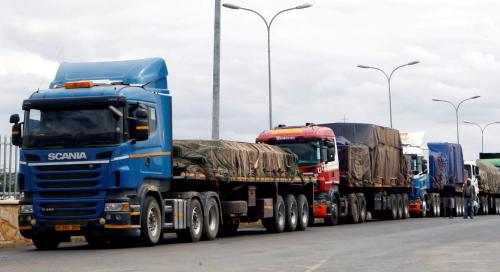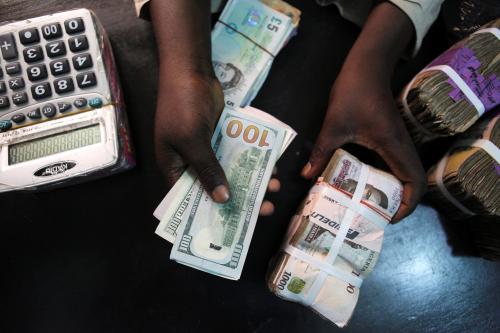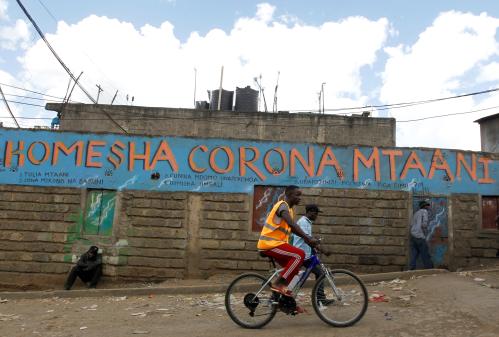In April, the United Nations Economic Commission for Africa published “COVID-19 in Africa: Protecting Lives and Economies,” which analyzes the potential human and economic cost of the pandemic in Africa, and argues that strong partnerships—both regional and international—will be needed to reduce the impact of the crisis. In particular, the report states that continued trade, medical cooperation—including the sharing of intellectual property on testing kits and vaccines—and innovative financing facilities from development finance institutions can play a crucial role in saving lives and bolstering economies.
Development finance institutions’ actions will be important in part because Africa’s fiscal capacity to respond to the crisis is limited. As Figure 1 shows, Africa’s tax-to-GDP ratio was low and falling even before the pandemic. Africa has the lowest tax-to-GDP ratio of any region, at 13.4 percent in 2018, compared to 14 percent in Asia, 25 percent in Europe, and 18 percent in Latin America. The report states that now, as borders close and trade slows in response to COVID-19, governments will collect drastically less revenue from sources such as tourism, travel, and taxes on imported goods. Local governments will also face a decline in own-source revenues and national transfers. The report states that, as a result, the fiscal capacity of African national and local governments to respond to the crisis will be heavily constrained.
Figure 1. Africa’s tax-to-GDP ratio, 2013-2018
 Source: UNECA, COVID-19 in Africa: Protecting Lives and Economies, 2020
Source: UNECA, COVID-19 in Africa: Protecting Lives and Economies, 2020
Compounding this issue are African countries’ high debt-to-GDP levels, high fiscal deficits, high costs of borrowing, and depreciated currencies, which further limit countries’ fiscal space to respond to the crisis. Twenty-two African countries had debt-to-GDP ratios above 61 percent in 2019, exceeding the 60 percent that is often suggested by economists as a prudential upper bound for developed countries, and far exceeding the 40 percent experts recommend for developing countries. More than half of African countries recorded fiscal deficits above 3 percent in 2019. Costs of borrowing are extremely high: For example, several major African countries, including South Africa, Nigeria, Kenya, and Egypt, have yields over 10 percent on 10-year sovereign bonds, while countries such as Vietnam, India, and Indonesia have yields of 3 percent, 6 percent, and 8 percent, respectively. Finally, as Figure 2 shows, the depreciation of many major African currencies since the beginning of 2020 has made issuing and servicing debt even more difficult, since most African bonds are issued in dollars and euros.
Figure 2. Currency depreciation in major African economies
 Source: UNECA, COVID-19 in Africa: Protecting Lives and Economies, 2020.
Source: UNECA, COVID-19 in Africa: Protecting Lives and Economies, 2020.
Note: EGP = Egyptian pound, ZOF = West African CFA franc, KES = Kenyan shilling, DZD = Algerian dinar, NGN = Nigerian naira, ZAR = South African rand.
As a result of these challenges, the report warns that Africa does not have the fiscal space to deal with the COVID-19 pandemic or to enact the necessary fiscal responses to prevent economic collapse. As a result, the report suggests that the global community must mobilize about $100 billion for the continent’s response, including $15 billion required immediately for health care and $85 billion for emergency budgetary support to mitigate revenue shortfalls and fund fiscal stimuli, such as increased spending on unemployment benefits, direct support to sectors such as tourism and travel, and consumer demand support. For more research and commentary on Africa’s rising debt see “Is sub-Saharan Africa facing another systemic sovereign debt crisis?” and the associated blog by Brahima Coulibaly, Dhruv Gandhi, and Lemma Senbet. For recommendations on how the international community can support Africa during this crisis, see “COVID-19 and debt standstill for Africa: The G-20’s action is an important first step that must be complemented, scaled up, and broadened.”





Commentary
Figures of the week: Africa’s fiscal response to COVID-19
May 13, 2020